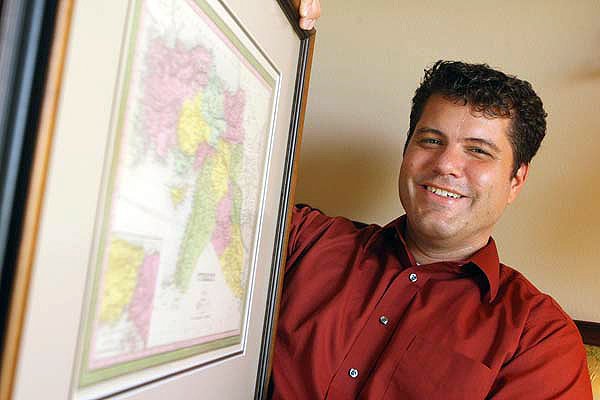LITTLE ROCK — In spring 2008, civil servant Erik Ryan returned to his trailer to find shrapnel from a recent rocket explosion had punctured three holes into his shower wall and turned a nearby sport utility vehicle into "Swiss cheese."
Ryan, a Jacksonville native then on a six-week tour of duty, still decided to return to Baghdad for a year of service starting that August.
The violence "was very much what I expected for the most part," he said. "I want to serve my country because it's important to me," Ryan said Wednesday morning at his parents' Jacksonville home. He'd recently returned from the U.S. Embassy in Baghdad, where he worked to establish a self-sufficient Iraqi oil industry.
Though some of the earlier violence had subsided, Ryan said his forays out of the International Zone, an enclosed area in central Baghdad where U.S. occupation authorities live and work, still warranted high security. Trips to the Iraqi Oil Ministry taken once or twice a week required an armored SUV, body armor, a militia with machine guns and a helicopter.
In his time in Iraq, Ryan, 38,briefed commanding Gens. David Petraeus and Ray Odierno as well as two U.S. ambassadors to Iraq. "I got to work on things I may never be able to do again," he said. "It's a unique experience. It's a rewarding experience."
Ryan, whose dyslexia kept him from learning to read and write English until about 9, also briefed Iraqi officials at the oil ministry in Arabic. Assigned to learn Arabic in 1995 when he entered the military's Defense Language Institute in Monterey, Calif., Ryan came to love the language and its culture. But he struggled early on and recalled an instructor specializing in language disabilities telling him to not even try learning Arabic.
Ryan responded: "Well, I'm in the Army. I don't choose what languages I learn and what I do."
As a Semitic language, Arabic uses a different alphabet than English, which can confound some Americans trying to learn it. Ryan recalled a running joke at his language school about students afflicted with "dots-lexia, because Arabic has dots that will determine what the letter will be."
Ryan, whose mother is Dutch, grew up listening to that language and visiting the Netherlands on a yearly basis. He knew he wanted to enter the Foreign Service after hearing a diplomat's lecture at the University of Arkansas in Fayetteville as a freshman. But he had to wait until 21 to join, and in the meantime he decided college then " wasn't right for me."
Ryan joined the U.S. Army in 1992 and over the next eight years held a variety of jobs including defense artillery crew member in Germany and signals intelligence analyst in Hawaii.
After failing the oral assessment section of his Foreign Service Officer Test in 2000, he began an international-relations track at the University of Arkansas at Little Rock. He spent a year learning German in Graz, Austria.
After graduating in 2004, while Ryan prepared to retake his foreign service exam, he worked at a hotel and taught as a substitute teacher at North Little Rock High School, where he helped teach Spanish. "I enjoyed the heck out of that job," he said, recalling how the students enjoyed hearing about his globe trotting and listening to him speak different languages.
After joining the Foreign Service in March 2007, Ryan worked at the U.S. Department of State's Iraq desk in Washington, D.C. He improved his Arabic with night and weekend classes and developed friendships with Iraqis to help hone it further.
He also met his fiancee, Melissa Brewster, at the Foreign Service Institute.
Last fall in Baghdad, Ryan worked in Saddam Hussein's Republican Palace, which housed the U.S. Embassy after Americans helped capture the city in April 2003.
While working 70 hours a week, he forgot his opulent surroundings for the most part, except late at night. He recalled walking up a "very grand" marble staircase, seeing a beautiful chandelier and visiting a huge marble bathroom. "It was kind of weird to work in."
At the beginning of 2009, the embassy moved to a new $700million complex, which Ryan found pleasant because "you have a lot more open space. You can see a distance." Although lamenting his lack of Arabic practice within the International Zone, Ryan recalled enjoying outdoor barbecues and a local American bar called Baghdaddy's.
Ryan left Baghdad four times to travel to other cities. He also wanted to go to Fallujah with two close friends were working on a wastewater-treatment plant there.
Those friends were returning from such a trip on Memorial Day when a roadside bomb exploded and killed them. "I was on R&R at the time ... otherwise I might have gone on the trip," he said.
Although he "would have been happy to stay another year," Ryan returned to the U.S. at the request of his fiancee. They will serve together at the U.S. Embassy in Berlin for two years starting next summer.
Long-term, Ryan said he wants to return to the Middle East to work in the energy sector and become fluent in Arabic. He said he loves being paid to learn languages but also serving something larger than himself.
"In many ways you're not only serving your country whenever you're in Iraq. You're also serving Iraq," Ryan said. "It is not often that the goals of two separate countries coincide exactly - that success for one is also success for the other."
Arkansas, Pages 9, 14 on 08/31/2009
